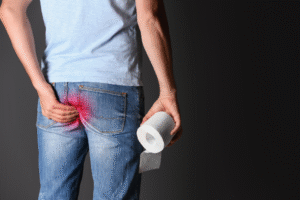
Piles, also known as hemorrhoids, are one of the most common anorectal problems affecting people across all age groups. They can cause pain, discomfort, bleeding, itching, and even embarrassment for many patients. Despite being such a widespread condition, piles are often left untreated due to social stigma, lack of awareness, or fear of surgery.
In this detailed article, we’ll explore:
- What piles are and why they occur
- Signs and symptoms you should not ignore
- Medical (non-surgical) treatment options
- Surgical treatment options and when they are needed
- Lifestyle changes to prevent recurrence
- How to choose the best piles doctor in Faridabad
What Are Piles (Hemorrhoids)?
Piles are swollen and inflamed blood vessels in the rectum and anus. They can develop inside the rectum (internal piles) or around the anus (external piles).
Types of Piles:
- Internal Hemorrhoids – Located inside the rectum, usually painless but may cause bleeding.
- External Hemorrhoids – Form under the skin around the anus, causing pain, swelling, and itching.
- Thrombosed Hemorrhoids – External piles with blood clots, often extremely painful and requiring medical attention.
Causes of Piles
Several factors can lead to piles, including:
- Chronic constipation or straining during bowel movements
- Low-fiber diet
- Prolonged sitting or sedentary lifestyle
- Pregnancy (due to increased abdominal pressure)
- Obesity
- Family history of hemorrhoids
Symptoms of Piles
Common signs and symptoms include:
- Bleeding during bowel movements (bright red blood)
- Itching or irritation in the anal region
- Pain and discomfort, especially when sitting
- A lump near the anus that may be tender or painful
- Leakage of stool or mucus
👉 If you notice these symptoms, it’s best to consult a specialist early. Delaying treatment can worsen the condition and lead to complications.
Medical (Non-Surgical) Treatment for Piles
For mild to moderate piles, doctors often recommend conservative management before suggesting surgery.
- Lifestyle & Dietary Changes
- Increase fiber intake (fruits, vegetables, whole grains)
- Drink 8–10 glasses of water daily
- Avoid straining during bowel movements
- Regular exercise to improve digestion and circulation
- Medications
- Stool softeners: Prevent constipation and reduce straining.
- Topical creams/ointments: Reduce swelling, itching, and pain.
- Oral pain relievers: For temporary relief from discomfort.
- Minimally Invasive Office-Based Procedures
These treatments are recommended for early-stage piles and can often be done without hospitalization:
- Rubber Band Ligation: A band is tied at the base of hemorrhoid to cut off blood supply, making it shrink.
- Sclerotherapy: Injection of a chemical solution to shrink the hemorrhoid.
- Infrared Coagulation (IRC): Heat therapy to shrink piles.
These options are effective in early stages, but recurrence is possible. Advanced cases usually require surgery.
Surgical Treatment for Piles
When piles are severe, persistent, or recurrent, surgical treatment becomes the best option.
Common Surgical Procedures:
- Hemorrhoidectomy
- Traditional surgery to remove hemorrhoids.
- Effective for large, severe, or recurrent piles.
- Requires anesthesia and hospital stay.
- Stapled Hemorrhoidopexy (MIPH – Minimally Invasive Procedure for Hemorrhoids)
- A modern, less painful technique.
- Staples are used to reposition and reduce blood supply to piles.
- Faster recovery compared to conventional surgery.
- Laser Hemorrhoidoplasty
- Uses laser energy to shrink piles.
- Minimally invasive, less pain, minimal bleeding.
- Quick recovery and minimal downtime.
Medical vs Surgical Treatment: Which One is Right for You?
The choice between medical vs surgical treatment depends on:
- Severity of piles (stage/grade)
- Symptoms (pain, bleeding, recurrence)
- Response to conservative treatment
- Overall health and lifestyle
| Condition | Medical Management | Surgical Treatment |
| Mild piles (Grade I-II) | Diet, lifestyle changes, ointments, minimally invasive procedures | Not usually required |
| Moderate piles (Grade II-III) | Rubber band ligation, sclerotherapy, infrared coagulation | Considered if medical treatment fails |
| Severe piles (Grade III-IV) | Limited benefit | Surgery (Stapler/Laser/Hemorrhoidectomy) is most effective |
If you have recurrent or advanced piles, surgery—especially modern techniques like laser or stapler surgery—offers better long-term relief.
Recovery After Piles Surgery
- Most patients can resume normal activities within 3–7 days (depending on the procedure).
- Mild discomfort, swelling, or bleeding may occur but usually resolves quickly.
- Doctors recommend a high-fiber diet, adequate hydration, and avoiding straining to prevent recurrence.
Preventing Piles: Simple Tips
- Eat a fiber-rich diet (30–35 grams daily).
- Stay hydrated throughout the day.
- Exercise regularly to maintain healthy digestion.
- Don’t ignore the urge to pass stools.
- Avoid sitting for long hours at a stretch.
- Maintain a healthy weight.
Why Choose Dr. Manu Shankar – Best Piles Doctor in Faridabad
If you’re looking for the best piles doctor in Faridabad, Dr. Manu Shankar offers expert diagnosis and treatment tailored to each patient.
- Experienced in laparoscopic and laser surgeries for piles.
- Focuses on minimally invasive techniques for faster recovery.
- Provides personalized care, from diagnosis to post-surgery follow-up.
- Trusted by patients across Faridabad and Delhi NCR for his surgical expertise.
With advanced technology and patient-centered care, Dr. Manu Shankar ensures safe, effective, and long-lasting relief from piles.
Final Thoughts
Piles can be painful and frustrating, but the good news is that effective treatments are available. For early cases, lifestyle modifications and medical management may be enough. However, in advanced stages, surgery—especially minimally invasive options like laser or stapler surgery—offers the best long-term results.
If you’re struggling with piles and looking for the best piles doctor in Faridabad, consult Dr. Manu Shankar for expert advice and advanced treatment options. Don’t suffer in silence—timely care can restore your comfort and quality of life.

